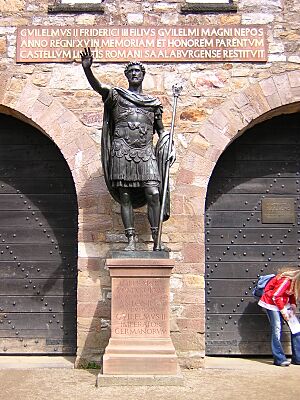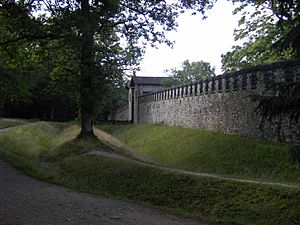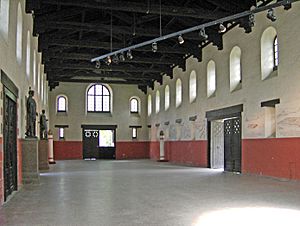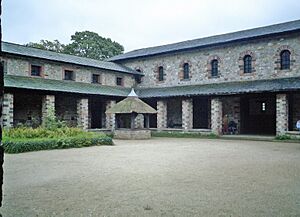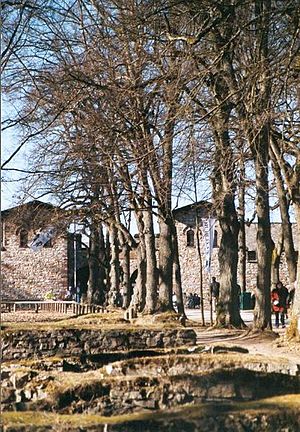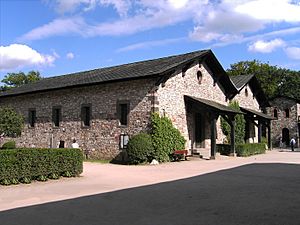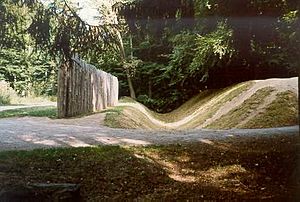Saalburg facts for kids
Quick facts for kids Saalburg |
|
|---|---|
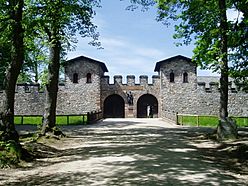
The Porta Praetoria (main gate), and circuit wall
|
|
| Lua error in Module:Location_map at line 420: attempt to index field 'wikibase' (a nil value). | |
| Alternative name(s) | (Kastell Saalburg) |
| Type | A.1) – A.2) Schanzen B) Numerus fort C) Cohort fort |
| Place in the Roman world | |
| Limes | Upper Germanic Limes, High Taunus section |
| Structure | |
| — A.1) – A.2) Earth and wattle B) wood and earth fort C.1) wood/stone wall C.2) mortared stone wall structure — |
|
| Size and area | (A.1) 0.11 ha A.2) ? B) 0.7 ha C.1) − C.2) 3.2 ha ha) |
| Stationed military units | |
| — Cohorts — | |
| A) unknown vexillatia B) unknown numerus C.1) − C.2) Cohors II Raetorum civium Romanorum equitata |
|
| Location | |
| Altitude | 418 m (1,371 ft) |
| Town | Bad Homburg vor der Höhe |
| State | Hesse |
| Country | Germany |
| Site notes | |
| Condition | reconstructed |
The Saalburg is an amazing Roman fort located in Germany. It sits on a mountain ridge called the Taunus, near the town of Bad Homburg. This fort was part of the Limes Germanicus, which was a long border defense built by the Romans.
What makes the Saalburg special is that it's the most completely rebuilt Roman fort in all of Germany. Imagine stepping back in time! Since 2005, the Saalburg has been a UNESCO World Heritage site. This means it's recognized as a very important place for everyone in the world to protect.
Contents
Discovering the Saalburg
People started exploring the Saalburg site a long time ago, around 1853. But a big push to learn about Roman sites in Germany happened in 1892. This was when a special group, the Reichs-Limes-Kommission, began to study the entire Roman border.
Two archaeologists, Louis Jacobi and his son Heinrich Jacobi, worked hard to explore the Saalburg. Their detailed findings were very important. In 1897, the German Emperor, Kaiser Wilhelm II, decided to rebuild the Saalburg fort. He wanted it to look just like it did in Roman times.
Because of this, the Saalburg became the most fully reconstructed fort along the entire Roman border. It also has the Saalburg Museum. This museum is one of the most important places for studying the Roman border in Germany.
Why the Location Was Important
Since ancient times, important trade routes crossed the Taunus mountains. These paths connected the Rhine-Main plain with other areas. The Saalburg fort was built right next to one of these main routes.
This location was very strategic. It was a mountain pass that the Romans first fortified during their wars against a group called the Chatti. They built two simple earth camps there first, around 81-96 AD.
The Roman Fort
How the Fort Changed Over Time
Around 90 AD, a simple fort made of wood and earth was built. This fort housed a numerus, which was a small Roman army unit of about 160 soldiers. Some clues suggest these soldiers might have come from Britain.
Later, around 135 AD, a much larger fort was built. This new fort was for a cohort, a bigger unit of about 500 soldiers. It was designed to face the growing Roman city of Nida (now called Heddernheim).
At first, the walls of this new fort were made of wood and stone. But in the second half of the 2nd century, they were replaced with strong stone walls. The fort you see reconstructed today is based on this final stone version. It was a large rectangle, about 147 by 221 meters.
Who Lived in the Fort
The cohort fort was home to the Cohors II Raetorum civium Romanorum equitata. This was a unit of about 500 infantry soldiers, some of whom also rode horses. They were probably commanded by the main Roman army base in Mainz. This unit had moved to the Saalburg after being stationed in other forts.
The fort was used by these soldiers until the Roman border fell around 260 AD. During this time, the names of the unit and some of its commanders were carved into stone.
In the early 200s AD, the border became less safe. Groups like the Alamanni attacked Roman lands. By 260 AD, the Romans lost all the areas east of the Rhine river. The Saalburg fort seems to have been left by the Romans on purpose, without a big battle. After it was abandoned, people used its stones to build other things.
Inside the Fort Walls
The Saalburg fort, as it's rebuilt today, is a typical Roman fort. It's a rectangle with four gates. The inside area is about 3.25 hectares. It was protected by a double ditch and strong stone walls. The outside of the walls was painted to look like fancy stone blocks. Inside, there was an earth ramp so defenders could get to the top of the wall.
The main gate, called the porta praetoria, faced away from the border and towards the city of Nida. The most important building inside was the principia. This was the headquarters, with a central courtyard and offices for the officers. It also had a large hall where the soldiers could gather.
Other important buildings included the praetorium, which was the commander's house, and a large horreum, which was a grain storage building. The rest of the fort was filled with stables, workshops, and barracks where the soldiers lived. Two of these soldier barracks have been rebuilt, so you can see what they looked like.
The Civilian Village (Vicus)
The Saalburg is special because it's not just the fort that's been rebuilt. Parts of the civilian village, called a vicus, have also been dug up and preserved. This village was right outside the fort, along the road that led to Nida.
Right outside the main gate, you can see the ruins of a mansio, which was like an official hotel. Behind it, there was a large bathhouse for the soldiers. Further along the road, you can see the foundations of houses where civilians lived. There was also a shrine to Mithras, a god popular with Roman soldiers.
The fort's bathhouse was quite big and had all the main parts of a Roman bath. It had a changing room, a cold bath, lukewarm baths, a hot bath, and even a sauna. These rooms were heated by a clever system called a hypocaust, which sent hot air under the floors and through the walls.
Archaeologists believe that the fort and the village together might have been home to up to 2,000 people. This included about 500 soldiers and 1,500 civilians.
The Saalburg Museum
The Saalburg is a great place to visit because it's an archaeological park and museum. But it's also a place where scientists do important research.
When you visit, you can see the fully rebuilt walls and gates. You can explore the principia (headquarters) with its shrine for military standards. You can also see the assembly hall, the horreum (grain store), and the two barracks buildings where soldiers lived. The commander's house, the praetorium, is also partly rebuilt.
The horreum building now houses an interesting exhibition. It teaches you about Roman culture, history, architecture, and military life in Germany. The museum has a large collection of Roman tools, weapons, and everyday items found at the Saalburg and nearby sites. It also has models of buildings and the landscape.
The Saalburg is also a famous research center. It has a special library with many books about Roman archaeology. The Saalburg Museum often holds meetings for experts and publishes its own academic books. Sometimes, you can even enjoy classical concerts there!
Exploring the Surroundings
Just a short walk north of the fort's back gate, you'll find the actual Roman border, the limes. Part of this border defense, including a ditch, an earth bank, and a wooden fence, has been rebuilt here.
The limes near the Saalburg is very well preserved. You can easily follow its path through the landscape. The ditch and bank are still clearly visible in many places. Many of the old Roman watchtowers are also still there, either partly preserved or as small mounds in the ground. This makes the Saalburg a great place to start exploring more of the Roman border.
Here are some other interesting Roman sites near the Saalburg:
| ORL | Name | What you can see today |
| KK | Kleinkastell Heidenstock | A small stone fort with one gate, about 440 square meters. Its walls are partly preserved or visible in the ground. |
| Wp 3/59 | Roßkopf | Two clear stone mounds near the Roßkopf mountain. |
| Wp 3/60 | Einsiedel | Preserved foundations and remains of a water storage tank. |
| Wp 3/61 | Auf dem Kieshübel | Preserved foundations of two stone towers, and traces of two wooden towers. |
| Wp 3/62 | Am Hollerkopf | Barely visible remains of a stone tower. |
| Wp 3/63 | Weißestein | A stone tower mound with partly preserved foundations. |
| ORL 11 | Cohort Fort Saalburg | See above |
| Wp 3/68 | Am Fröhlichemannskopf | A visible stone tower foundation, and a barely visible wooden tower location. |
| Wp 3/69 | Am Bennerpfad | A preserved stone tower foundation. |
| KK | Kleinkastell Lochmühle | A small stone fort with one gate, about 400 square meters. You can see it in the terrain. |
Near the Saalburg, there's also a copy of a Jupitersäule. This was a tall, painted stone pillar dedicated to the Roman god Jupiter. These pillars were common in the Roman provinces of Germany.
Getting to the Saalburg
When the fort was rebuilt in the late 1800s and early 1900s, many people wanted to visit. To make it easy, a special train line, the Saalburgbahn, was built from Bad Homburg. This train line eventually closed, but you can still see small traces of it.
Today, you can easily reach the Saalburg by taking a bus from Bad Homburg. Buses run every hour.
More to Read
- Dietwulf Baatz: Saalburg (Taunus). In: Die Römer in Hessen. Nikol, Hamburg 2002.
- Dietwulf Baatz: Der Römische Limes. Archäologische Ausflüge zwischen Rhein und Donau. Gebr. Mann, Berlin 2000.
- Margot Klee: Die Saalburg. Theiss, Stuttgart 1995.
- Margot Klee: Der Limes zwischen Rhein und Main. Theiss, Stuttgart 1989.
- Anne Johnson: Römische Kastelle des 1. und 2. Jahrhunderts n. Chr. in Britannien und in den germanischen Provinzen des Römerreiches. Zabern, Mainz 1987.
- Egon Schallmayer (ed.): Hundert Jahre Saalburg. Vom römischen Grenzposten zum europäischen Museum. Zabern, Mainz 1997.
- Heinrich Jacobi: Kastell Nr. 11 Saalburg, Der obergermanisch-raetische Limes des Römerreiches, Series B, Vol. II, Frankfurt 1937.
- Since 1910, a special book called the Saalburg Annual (Saalburg Jahrbuch) has been published. It has scholarly articles about Roman archaeology.
- Since 1995, the Saalburg-Schriften series has presented archaeological studies to a wider audience.
See also
 In Spanish: Saalburg para niños
In Spanish: Saalburg para niños
 | James B. Knighten |
 | Azellia White |
 | Willa Brown |


